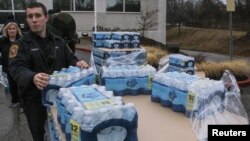Officials in the U.S. state of West Virginia on Tuesday lifted more of a ban on drinking tap water for customers who had been affected by a chemical spill that left the state's water supply nearly unusable for hundreds of thousands since last week.
A total of about 38,000 customers can now use tap water, with residents of the Southside, Southridge and George Washington areas near state capital Charleston cleared to drink or wash with their tap water, West Virginia American Water said in statements.
Downtown Charleston and nearby Kanawha City were given the go-ahead on Monday.
Consumers were instructed to flush their systems before using the water, which had been barred for use except for toilets since the chemical discharge into the Elk River on Thursday.
More than 300,000 consumers were affected after as much as 28,000 liters of 4-methylcyclohexane methanol, or crude MCHM, leaked into the river.
Asked at a news conference if there were enough regulations to prevent such spills, U.S. House Speaker John Boehner said the plant had not been inspected since 1991 and there were ample rules on the books.
“Somebody ought to be held accountable here,” he said. “What we try to do is look at those regulations that we think are cumbersome, are over the top, and that are costing the economy jobs. That's where our focus continues to be.”
Officials said on Monday that it might be several days before the entire system, with its hundreds of kilometers of pipe, was safe to use.
The crude MCHM chemical, which is used in coal processing, leaked into the river from a tank at a Freedom Industries site about 1.5 km upriver from a water treatment plant, the biggest in the state.
Governor Earl Ray Tomblin declared a state of emergency in nine counties, including Charleston, shutting down schools and businesses.
Freedom Industries, which makes specialty chemicals for the cement, mining and steel industries, has apologized for the incident.
Water tainted by crude MCHM smells faintly of licorice. Contact with the water can cause nausea, vomiting, dizziness, diarrhea, rashes and reddened skin.
A total of 231 people had visited emergency rooms with symptoms, and 14 had been admitted, officials said.
The fouled water has flowed downstream into the Ohio River, and utility spokesmen in Kentucky and Ohio said they were monitoring water quality to be sure consumers were not affected.
The U.S. Chemical Safety Board and the U.S. attorney for the Southern District of West Virginia are investigating the spill.
A total of about 38,000 customers can now use tap water, with residents of the Southside, Southridge and George Washington areas near state capital Charleston cleared to drink or wash with their tap water, West Virginia American Water said in statements.
Downtown Charleston and nearby Kanawha City were given the go-ahead on Monday.
Consumers were instructed to flush their systems before using the water, which had been barred for use except for toilets since the chemical discharge into the Elk River on Thursday.
More than 300,000 consumers were affected after as much as 28,000 liters of 4-methylcyclohexane methanol, or crude MCHM, leaked into the river.
Asked at a news conference if there were enough regulations to prevent such spills, U.S. House Speaker John Boehner said the plant had not been inspected since 1991 and there were ample rules on the books.
“Somebody ought to be held accountable here,” he said. “What we try to do is look at those regulations that we think are cumbersome, are over the top, and that are costing the economy jobs. That's where our focus continues to be.”
Officials said on Monday that it might be several days before the entire system, with its hundreds of kilometers of pipe, was safe to use.
The crude MCHM chemical, which is used in coal processing, leaked into the river from a tank at a Freedom Industries site about 1.5 km upriver from a water treatment plant, the biggest in the state.
Governor Earl Ray Tomblin declared a state of emergency in nine counties, including Charleston, shutting down schools and businesses.
Freedom Industries, which makes specialty chemicals for the cement, mining and steel industries, has apologized for the incident.
Water tainted by crude MCHM smells faintly of licorice. Contact with the water can cause nausea, vomiting, dizziness, diarrhea, rashes and reddened skin.
A total of 231 people had visited emergency rooms with symptoms, and 14 had been admitted, officials said.
The fouled water has flowed downstream into the Ohio River, and utility spokesmen in Kentucky and Ohio said they were monitoring water quality to be sure consumers were not affected.
The U.S. Chemical Safety Board and the U.S. attorney for the Southern District of West Virginia are investigating the spill.





